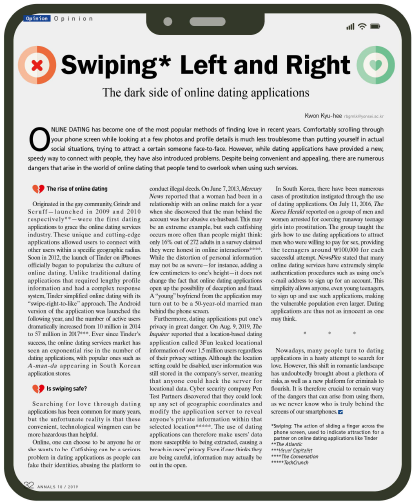The dark side of online dating applications

ONLINE DATING has become one of the most popular methods of finding love in recent years. Comfortably scrolling through your phone screen while looking at a few photos and profile details is much less troublesome than putting yourself in actual social situations, trying to attract a certain someone face-to-face. However, while dating applications have provided a new, speedy way to connect with people, they have also introduced problems. Despite being convenient and appealing, there are numerous dangers that arise in the world of online dating that people tend to overlook when using such services.
The rise of online dating
Originated in the gay community, Grindr and Scruff—launched in 2009 and 2010 respectively**—were the first dating applications to grace the online dating services industry. These unique and cutting-edge applications allowed users to connect with other users within a specific geographic radius. Soon in 2012, the launch of Tinder on iPhones officially began to popularize the culture of online dating. Unlike traditional dating applications that required lengthy profile information and had a complex response system, Tinder simplified online dating with its “swipe-right-to-like” approach. The Android version of the application was launched the following year, and the number of active users dramatically increased from 10 million in 2014 to 57 million in 2017***. Ever since Tinder’s success, the online dating services market has seen an exponential rise in the number of dating applications, with popular ones such as A-man-da appearing in South Korean application stores.
Is swiping safe?
Searching for love through dating applications has been common for many years, but the unfortunate reality is that these convenient, technological wingmen can be more hazardous than helpful.
Online, one can choose to be anyone he or she wants to be. Catfishing can be a serious problem in dating applications as people can fake their identity, abusing the platform to conduct illegal deeds. On June 7, 2013, Mercury News reported that a woman had been in a relationship with an online match for a year when she discovered that the man behind the account was her abusive ex-husband. This may be an extreme example, but such catfishing occurs more often than people might think: only 16% out of 272 adults in a survey claimed they were honest in online interactions****. While the distortion of personal information may not be as severe—for instance, adding a few centimeters to one’s height—it does not change the fact that online dating applications open up the possibility of deception and fraud. A “young” boyfriend from the application may turn out to be a 50-year-old married man behind the phone screen.
Furthermore, dating applications put one’s privacy in great danger. On Aug. 9, 2019, The Inquirer reported that a location-based dating application called 3Fun leaked locational information of over 1.5 million users regardless of their privacy settings. Although the location setting could be disabled, user information was still stored in the company’s server, meaning that anyone could hack the server for locational data. Cyber security company Pen Test Partners discovered that they could look up any set of geographic coordinates and modify the application server to reveal anyone’s private information within that selected location*****. The use of dating applications can therefore make users’ data more susceptible to being extracted, causing a breach in users’ privacy. Even if one thinks they are being careful, information may actually be out in the open.
In South Korea, there have been numerous cases of prostitution instigated through the use of dating applications. On July 11, 2016, The Korea Herald reported on a group of men and women arrested for coercing runaway teenage girls into prostitution. The group taught the girls how to use dating applications to attract men who were willing to pay for sex, providing the teenagers around ₩100,000 for each successful attempt. NewsPim stated that many online dating services have extremely simple authentication procedures such as using one’s e-mail address to sign up for an account. This simplicity allows anyone, even young teenagers, to sign up and use such applications, making the vulnerable population even larger. Dating applications are thus not as innocent as one may think.
* * *
Nowadays, many people turn to dating applications in a hasty attempt to search for love. However, this shift in romantic landscape has undoubtedly brought about a plethora of risks, as well as a new platform for criminals to flourish. It is therefore crucial to remain wary of the dangers that can arise from using them, as we never know who is truly behind the screens of our smartphones.
*Swiping: The action of sliding a finger across the phone screen, used to indicate attraction for a partner on online dating applications like Tinder
**The Atlantic
***Visual Capitalist
****The Conversation
*****TechCrunch
Kwon Kyu-hee
rbgmlk@yonsei.ac.kr

